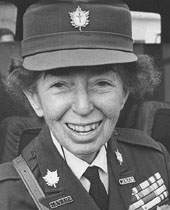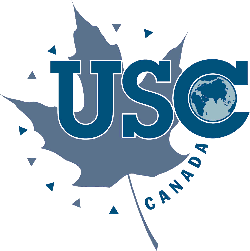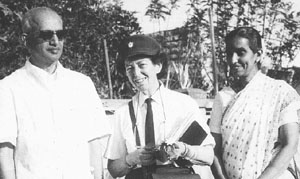 Dr. Lotta Hitschmanova (November 28, 1909-August 1, 1990), a Czech immigrant to Canada from war-ravaged Europe, was the founder of the Unitarian Service Committee of Canada (USC). She directed the USC for forty years, making yearly trips around the world, searching out villages and towns in need of Canadian aid to recover from war, drought, disease, and poverty. She eventually established 150 programs in 20 countries.
Dr. Lotta Hitschmanova (November 28, 1909-August 1, 1990), a Czech immigrant to Canada from war-ravaged Europe, was the founder of the Unitarian Service Committee of Canada (USC). She directed the USC for forty years, making yearly trips around the world, searching out villages and towns in need of Canadian aid to recover from war, drought, disease, and poverty. She eventually established 150 programs in 20 countries.
Lotta came from an upper-middle class family in Prague, Czechoslovakia. Although her family had a Jewish background, her parents, Max and Else Hitschmann, put more importance on social reform and education than the synagogue. Her father was a successful malt merchant, her mother socially connected. Both parents were adamant their daughters, Lilly and Lotta, should be well-educated, with the result that Lilly graduated with a degree in architecture and Lotta graduated from Prague University with diplomas in five languages—French, English, German, Spanish and Czech. Lotta eventually completed her Ph.D. from Prague University, then moved to Paris, where she attended the Sorbonne for two years, studying journalism, and political science. She planned to take up a diplomatic career.
In 1938, Lotta returned to Prague and started freelance writing for a variety of Czechoslovakian, Rumanian and Yugoslavian newspapers, where her articles became increasingly anti-Nazi. She began using the Slavic version of her name—Hitschmanova—as a patriotic show of anti-German sentiment. When Hitler was preparing to take over Czechoslovakia, her name appeared on a German list of unfriendly journalists. After hearing President Benes give a speech surrendering large amounts of Czechoslovakian territory to the German army, she wrote: “A world broke within me, my belief in international cooperation, in treaties signed by World Powers, failed.” Forced into exile, she spent the next four years working all over Europe as a journalist, librarian, or interpreter, doing all she could to avoid detection by the Nazis.
In 1942 Hitschmanova ended up in Marseilles, France, poor and starving. There she found a job as an interpreter and secretary for an immigration service. One day, standing in a food line in the market, she fainted from hunger and exhaustion. She was taken to the Unitarian Service Committee medical clinic (an outreach of the American Unitarian Association in Boston) to receive treatment. This was her introduction to Unitarians.
When she was denied a visa to the United States, Hitschmanova was given one to Canada, a country about which she knew nothing. After arriving in Ottawa, she quickly got a job with the Censorship Department reading German prisoner-of-war letters and gathering information for intelligence purposes. At the same time, she continued her work on behalf of the refugees in Europe, writing articles and giving speeches.
Hitschmanova’s greatest fear remained for her mother and father. She learned they had been taken to Terezin, the German model concentration camp used as a showcase for visiting Red Cross personnel. Most inmates, however, were later deported to the Auschwitz death camp. That was all Lotta ever learned about her parents. After the war she wrote desperate letters to old friends and neighbors in Prague, pleading them to find out all they could about the fate of her family. She was relieved to learn that her sister Lilly was living in Palestine, and later Egypt, with her husband Charles. Lilly and Charles eventually emigrated to Canada also.
When the war ended, Dr. Lotta, as she was later affectionately called, was offered several jobs but decided to devote her time to helping war-shocked and war-mutilated children, and other European refugees, find a future. With the help of the Ottawa Unitarian congregation, she formed a Canadian branch of the Unitarian Service Committee. She kept the new organization formally distinct from the Unitarian Church in order to avoid antagonizing funding sources or operating partners with different cultural, religious or political backgrounds. At first she believed her job would be finished in three or four years.
Because the American Unitarian Service Committee insisted that each program be run by an American, Hitschmanova chose to reorganize the USC of Canada independently from them. This was a philosophical difference that made the Canadian USC stand out from the other aid agencies at that time: overseas communities knew what they needed and had the best personnel to do it. She exercised a general supervision through her yearly visits to every USC program. At that time she found out what the needs were for the coming year. Her goal for each program was to make it self-sufficient as quickly as possible. “There are three basic principles in the field of the art of giving aid,” she later she said in a 1973 Brock University lecture. “To come as an open-minded friend and good listener, when offering help; to say goodbye to a project when it can continue on its own; to serve with a personal touch, because a relationship of confidence must lift your aid beyond the realm of a simple business proposition and prove that you really care.”
 In January 1946, Hitschmanova embarked on her first three-month cross-Canada fundraising tour. Three years later, she was travelling 17,000 km, speaking 96 times in 36 places, and raising $50,000. For the next four decades, she focused all of her energy and time on educating herself and Canadians about where there was the greatest need for Canadian aid, reaching out to thousands of supporters in her monthly newsletter, Jottings.
In January 1946, Hitschmanova embarked on her first three-month cross-Canada fundraising tour. Three years later, she was travelling 17,000 km, speaking 96 times in 36 places, and raising $50,000. For the next four decades, she focused all of her energy and time on educating herself and Canadians about where there was the greatest need for Canadian aid, reaching out to thousands of supporters in her monthly newsletter, Jottings.
Canada responded with enthusiasm. From 1945 on, Hitschmanova motivated generations of Canadians to help destitute children in post-war Europe, Japan, Korea, Vietnam, and independent India and Bangladesh. From farm kitchens in Saskatchewan to fishing boats in Nova Scotia and the towers of Toronto’s Bay Street, Dr. Lotta told people that their individual contributions made a difference.
And Canadians believed her, making 30,000 children’s layettes for Palestinian refugee camps and sending a carload of Saskatchewan barley to children in post-war Korea. They helped pay teachers and built health facilities in emerging India. Canadian fire stations were drop-off depots for donations and clothing. Unitarian church basements became warehouses where hundreds of people sorted clothes to be sent overseas to aid the enormous post-war needs of Europe, and later Asia and Africa.
Dr. Lotta was a contradiction to some. Although compassionate, practical and often innovative in finding solutions to Third World food and health problems, she was single-minded, demanding, and aggressive with government officials and others she felt weren’t doing enough. This resulted in a high USC staff turnover through the years. Stories about her ruthless side and her concern for economy are legion.
During these busy years USC television ads made Lotta Hitschmanova known around the world. Her Czech-accented voice-over request for financial help for the USC was a shared experience for several generations of Canadians. Her image was nearly as familiar: red hair and olive green Army nurse’s uniform, which she wore every day. She had chosen the army uniform originally because, in the 1940s, aid agency workers all wore uniforms.
 Hitschmanova’s busy life was focused solely on helping those in need around the world. She never married and had no children of her own. Her life was obsessed by the images of need she saw every moment during her overseas trips. “Very often I’m haunted by what I see during the day and so at night it’s difficult to sleep, and to forget.” During a 1967 trip to Bihar, India she found 30 million men, women and children “dying inch by inch”, starving to death because of drought. She wrote in a USC internal letter: “That was much crueler than if they had been killed by hand-grenades or earthquakes.” Within days she arranged for train carloads of milk powder to be bought and distributed.
Hitschmanova’s busy life was focused solely on helping those in need around the world. She never married and had no children of her own. Her life was obsessed by the images of need she saw every moment during her overseas trips. “Very often I’m haunted by what I see during the day and so at night it’s difficult to sleep, and to forget.” During a 1967 trip to Bihar, India she found 30 million men, women and children “dying inch by inch”, starving to death because of drought. She wrote in a USC internal letter: “That was much crueler than if they had been killed by hand-grenades or earthquakes.” Within days she arranged for train carloads of milk powder to be bought and distributed.
She found this sense of urgency for change repeated over and over, from starving, orphaned children freezing in the streets in devastated post-war Korean cities to Arab and Vietnamese refugees struggling to survive. Her nicknames of endearment grew: “Auntie Codfish” and “The Mother of a Thousand Orphans” for providing food and shoes with socks to Korean street children, and “Lotabai”, an affectionate play on “Lotta” in India.
Hitschmanova was a reporter’s delight, her own journalism background helping her to know what was needed to make a story. Reporters and editors called her “The Atomic Mosquito”, for her persistence in getting good media coverage. At the end of a long day of speeches and meetings, she never hesitated to call and berate an editor if she felt that her fundraising tour had not been given enough space in the local paper.
Throughout the years, Dr. Hitschmanova received numerous awards, including the 1975 Woman of the Year for India by Prime Minister Indira Gandhi. By this time, grateful governments around the world had acknowledged her work in their countries in a variety of ways: the Chevalier of Public Health from the Government of France and the Gold Medal from the Red Cross of France, 1950; the Medal of St. Paul from Greece, 1952; Public Service Medal from the Government of South Korea, 1962; Athena Mesolora Gold Medal from the Government of Greece, 1967; Officer of the Order of Canada, 1972; the Royal Bank of Canada Award, 1979; and Companion of the Order of Canada, 1980. In 1983, she received Officer of Meritorious Order of Mohlomi, Lesotho, and was only the third person to be given the Rotary Award for World Understanding. She refused to accept honourary doctorates from universities, saying she had worked hard enough in Paris and Prague to earn her own doctorate.
The final irony is that this articulate, passionate woman spent the last years of her life suffering from Alzheimer’s disease. Hitschmanova died of cancer in July 1990 in Ottawa. A memorial service was held at the Unitarian Church in Ottawa, of which she had been a long-time member.
The research for this biography comes from a combination of in-person interviews, articles, and material from the National Archives of Canada. There are 92,000 USC and Dr. Lotta items in the National Archives of Canada. The most important book on this subject is Clyde Sanger, Lotta and the Unitarian Service Committee Story (1986). See also Margaret Gooding, The Canadians: Adventures of Our People (1989). For information on the USC see their website, www.usc-canada.org.
Article by Joyce Thierry
Posted April 29, 2003